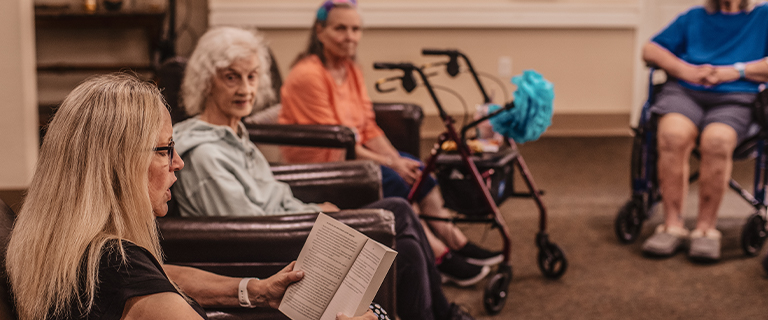Alzheimer’s disease is a progressive neurological disorder that impacts an individual’s memory, cognitive functions, and eventually the ability to perform even simple daily tasks. Approximately 6.9 million Americans over 65 have Alzheimer’s, and the numbers are rising, prompting necessary discussions around the condition, including its impact and legal classification.
Alzheimer’s is a disability, though what that means for your loved one depends on their individual symptoms. Those with Alzheimer’s may require specialized care, but this disability doesn’t exclude them from celebrating life with their community.
What Is Alzheimer’s Disease & Dementia?
Dementia is a term that encompasses several conditions that impair cognitive function, including Alzheimer’s disease, which is the most common form. Alzheimer’s progressively affects memory, thinking, and behavior, making daily activities challenging.
Alzheimer’s symptoms can start subtly and include:
- Difficulty with familiar tasks (e.g., managing finances, planning meals)
- Misplacing belongings
- Problems with judgment
- Difficulty following conversations
While occasional forgetfulness is common with age, Alzheimer’s disease goes beyond that and is not a normal part of aging.
Alzheimer’s does not only affect the individual diagnosed, but it also has a profound effect on their immediate family and caregivers. The emotional and physical strain can be immense.
What Causes Alzheimer’s Disease?
While the exact cause of Alzheimer’s disease is unknown, scientists believe it’s a complex interplay of factors affecting the brain. Research suggests a combination of:
- Changes in the brain: These include the buildup of abnormal proteins called plaques and tangles, which disrupt communication between brain cells.
- Genetics: Certain genes increase the risk of developing Alzheimer’s, though they’re not a guaranteed cause.
- Health, environmental, and lifestyle factors: Conditions like heart disease, diabetes, and obesity may be linked to increased risk. Conversely, healthy habits like a balanced diet, exercise, and mental stimulation might offer some protection.
Defining Alzheimer’s as a Disability Under the ADA
The term “disability” has both legal and social meanings. Socially, it refers to conditions that significantly limit someone’s ability to perform daily activities. Legally, it’s defined by specific acts and regulations.
The Americans with Disabilities Act (ADA) is a civil rights law prohibiting discrimination against people with disabilities. It ensures equal opportunities in employment, access to goods and services, and participation in government programs.
The ADA defines a person with a disability as someone who:
- Has a physical or mental impairment that substantially limits one or more major life activities.
- Has a history of such an impairment.
- Is perceived by others as having such an impairment.
Alzheimer’s disease is a progressive neurological disorder that affects memory, thinking, and (eventually) the ability to perform daily activities. Depending on the severity of the disease, Alzheimer’s may qualify as a disability under the ADA.
Defining Alzheimer’s as a Disability Under the SSA
The Social Security Administration (SSA) has specific disability criteria that determine eligibility for Social Security Disability Insurance (SSDI).
To qualify for SSDI with Alzheimer’s, a person must meet the following criteria:
- Their Alzheimer’s disease must be severe enough to significantly limit their ability to perform basic work activities or adapt to other types of work.
- They must have (or be expected to have) the condition for at least one year or result in death.
The SSA offers a program called Compassionate Allowances (CAL) to expedite the disability application process for certain severe medical conditions, including early-onset Alzheimer’s (generally diagnosed before age 65). This program can be helpful for individuals with a faster-progressing form of the disease.
Additional Benefits for Those with Alzheimer’s
Depending on your state’s regulations, Alzheimer’s may qualify as a disability for Medicaid coverage, which can help with long-term care costs.
Tax deductions or credits may also be available for those caring for someone with Alzheimer’s. However, these vary by state, and tax law is complex. We recommend consulting a tax professional for personalized advice.

How Alzheimer’s Affects Caregivers
Caring for a loved one with Alzheimer’s can be a journey filled with both challenges and rewards. You may experience a deep sense of connection as you provide care, but it’s also important to acknowledge the emotional and physical demands involved.
Many resources are available to support you and your loved one, including:
- Practical assistance: Services like home health aides, adult day programs, or meal delivery services can free up your time to pursue your own well-being and interests.
- Emotional support: Support groups, counseling services, and care programs create a vital support network.
- Respite care: Respite care provides temporary breaks from caregiving duties, allowing you to recharge, avoid caregiver burnout, and provide better care.
- Memory care: Specialized communities offer a safe and supportive environment with trained associates who help with daily living activities, manage medications, and create a stimulating environment. While memory care can be an investment, many families may find it offers peace of mind and specialized care as the disease progresses.
By accessing these support systems, you can create a more positive and enriching experience for both yourself and your loved one with Alzheimer’s.
Next Steps
When a loved one is diagnosed with Alzheimer’s, it can feel overwhelming, but you don’t have to navigate it alone. Professional care offers the support of a compassionate team dedicated to your loved one’s well-being, ensuring they receive the specialized attention they need at every stage.
At Parsons House Preston Hollow, we’re dedicated to providing compassionate, daily support in a loving environment. Schedule a tour to see how we can help nurture and celebrate your loved one’s life every day.



